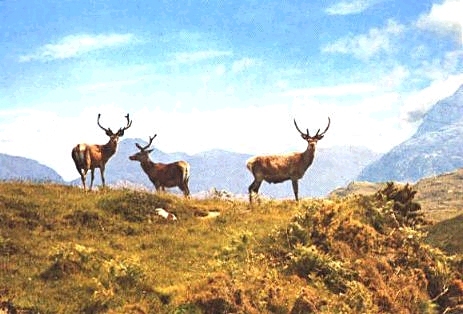Virgil's Aeneid
Book 1
Part 2 Aeneas reaches Carthage (158 - 222)
Landfall: Aeneas secures a hot meal for his men
Aeneas and his exhausted followers scrambled towards whatever land was nearest their current position, and set course for the coast of Libya. In a deep inlet, there is a place where an island with jutting promontories creates a harbour. Any wave from the open sea is broken by these capes as it splits in two entering the sheltered bay. On this side and that enormous cliffs tower skywards: a pair of rocky gorges loom above them, whilst in their shadow the waters remain calm and gentle. As one gets closer, there appears a backdrop of glistening forest, dark pinewoods stand erect and overhang with deep shade. In the rock face opposite is a cave with stalactites, inside which the waters are friendly, and there are resting-places carved from the rock: the home of nymphs. Here no ropes tied up the weary vessels, no sickle-toothed anchor was needed to secure them. [169]
Here Aeneas sailed in, mustering the seven ships which survived from the full number; desperate to touch dry ground, the Trojans disembarked to take possession of the land they had dreamed of, and flopped their salt-caked bodies on to the beach. Straightaway Achates struck a spark from flint, and started a fire with some leaves, which he then fed with dry stuff from round about, coaxing a flame from the tinder. Then they found some sodden grain and, tired of everything though they were, organised the cooking equipment and got ready to grind the rescued corn on a stone and bake it in the fire. [179]
 Aeneas meanwhile scaled a pinnacle of rock, and scanned the broad horizon, to see if he could locate where Antheus and his Trojan men o'war had been blown by the wind, or Capys, or the tall well-armed ships of Caicus. There was no sign of a ship, but he sighted three stags browsing along the shore; the rest of the herd trooped along behind, well strung out, and grazed among the dunes. He stood still and picked up his bow and well-flighted arrows, weapons which the devoted Achates had been carrying for him. First he felled the leading stags, who bore their heads with their branching antlers so proudly, and then he shot indiscriminately into the crowd, making the whole herd stampede through the leafy undergrowth; he did not stop until he had successfully brought to the ground seven massive carcases, one for each of his ships. Then he made for the harbour, and shared [the meat] among all his companions. After that the great man shared out the wine, which the noble Acestes had decanted into flasks, and presented to them as they departed from the shores of Trinacria, and lifted their sunken spirits with these words: [197]
Aeneas meanwhile scaled a pinnacle of rock, and scanned the broad horizon, to see if he could locate where Antheus and his Trojan men o'war had been blown by the wind, or Capys, or the tall well-armed ships of Caicus. There was no sign of a ship, but he sighted three stags browsing along the shore; the rest of the herd trooped along behind, well strung out, and grazed among the dunes. He stood still and picked up his bow and well-flighted arrows, weapons which the devoted Achates had been carrying for him. First he felled the leading stags, who bore their heads with their branching antlers so proudly, and then he shot indiscriminately into the crowd, making the whole herd stampede through the leafy undergrowth; he did not stop until he had successfully brought to the ground seven massive carcases, one for each of his ships. Then he made for the harbour, and shared [the meat] among all his companions. After that the great man shared out the wine, which the noble Acestes had decanted into flasks, and presented to them as they departed from the shores of Trinacria, and lifted their sunken spirits with these words: [197]
Aeneas tries to cheer his men up
"My friends. This is not our first taste of trouble. You have been through worse things. God will grant an end to this too. You have survived the crazed violence of Scylla, and her echoing gorge, you have dodged the Cyclops' missiles. Summon up your courage, and dismiss these craven fears. One day you will be glad to remember all this as well. Despite all manner of setbacks, despite so many faces of danger, we are progressing towards Latium, where the fates promise us a peaceful home. There it is decreed that the kingdom of Troy shall rise again. Stiffen yourselves, and prepare for better things." [206]
Such were his words, his expression showing optimism to mask his all-too-real depression, and suppress the deep despair in his heart. His men fell on their prey, thinking of the feast that was to come. They tore the flesh from the ribs and exposed the entrails; some chopped the meat into chunks and stabbed it still twitching on to skewers; others set up the cooking pots on the beach, and lit fires beneath. Finally, thanks to the meal, they got back their strength, as lounging on the grass they stuffed themselves with the juicy venison, washed down with vintage wine. After their hunger was assuaged by the banquet, and the tables had been cleared away, they started a lengthy questioning about their missing friends, poised between hope and despair, uncertain whether to believe they were still alive, or had suffered the ultimate fate, and could no longer answer to their names. In particular, Aeneas at one time bemoaned the lot of the brave Orontes, at another, the fate of Lycus and the great Gyas and the great Cloanthus. [222]



![[Next Page?]](next.gif)